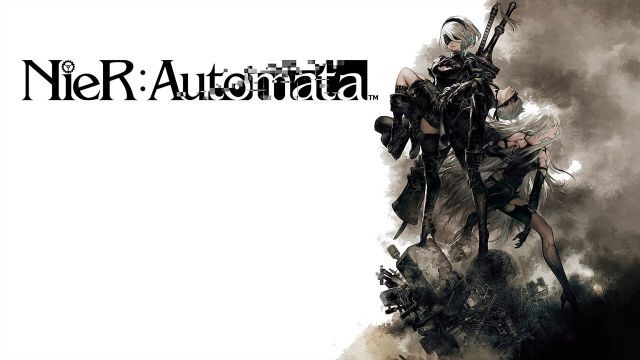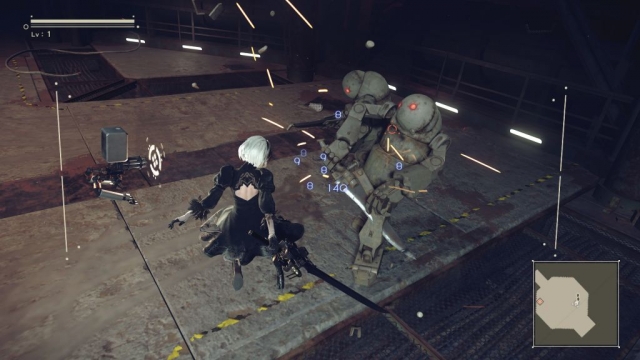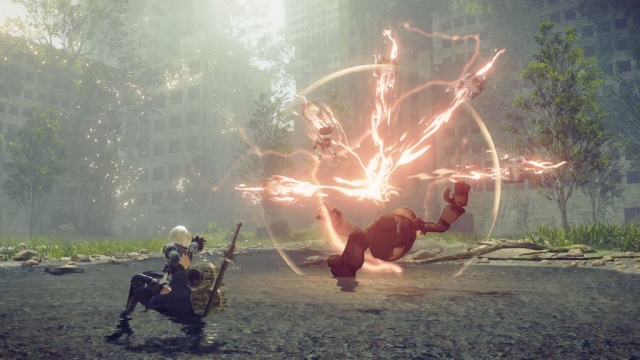NieR: Automata

Nier: Automata reminds me of an earlier period in game design, around the end of the ’90s and the beginning of the ’00s, which was a sort of golden age for high weirdness in Japan. A lot of the games I’m thinking of came out on the Dreamcast, like D2 or Illbleed, but you could also point to stuff like Breakdown on the original Xbox, Konami’s Lifeline, or From Software’s Echo Night series. These were games that had their own bizarre internal logic, to the point where they sometimes felt like you were having someone else’s dream.
Automata is often like that, once it gets going. You’re a combat android who dresses like a Gothic fetish ballerina, wielding hard-light swords against a hostile race of robots, most of which look and even act like rusted metal toys. The game switches its genre several times in the first ten minutes, going between three different kinds of arcade-style shoot-‘em-up before you end up playing an action game in the Platinum mold, with a heavy emphasis on style and finesse, and which often puts you up against enemies the size of office buildings. The game’s story is a sort of sad, slow meditation on time, death, and violence, set in the crumbling ruins of an unidentifiable city, millennia after an alien invasion forced humans to abandon Earth. I get the feeling that if any executive tried to suggest changes in order to make Automata more palatable to the mass market, that executive’s body will never be found.
This is the first of Yoko Taro’s games that I’ve played. People have recommended his work to me before, but it was always with an intense series of qualifiers about how weird, dark, and twisted it is. Now I can see why. Automata has a quietly despairing atmosphere, full of childlike robots pursuing quixotic missions that force you to destroy them, and the story has a faintly hopeless feel to it at the best of times. There’s just enough of an ominous air–maybe you’re not the good guys; maybe you don’t know the entire story–that it accompanies everything you do without overpowering it. Then you get to the alternate paths through the main game, where everything flies off the rails, but it still manages to surprise you.
Automata wants you to be in it for the long haul. The first run through the game should take you 15 to 20 hours, at which point you can restart the game to play through it again as two different characters, with more than twenty alternative endings depending on what you do or don’t do along the way. Some will take you by surprise and hinge on as little as a single decision; others require you to fail in key actions, commit murder or wipe out civilian populations.
It’s an easy game to learn, although it’s a little irritating before you have the chance to gear up. A lot of the basic everyday tools you have in an action game like this one, such as a short invincibility window after you get hit, are locked behind skills you have to acquire and equip. You also have a ridiculously low health pool for a character who’s ostensibly a combat android, so the first couple of hours of the game for me were punctuated with deaths that didn’t feel like they were entirely my fault. There isn’t much of a penalty for getting killed in Automata, though, and it isn’t long before you can accumulate enough passive healing and combat bonuses to skate through most fights.
Picking nits about the game’s systems, however, seems petty. Automata deserves to be experienced because it’s utterly unlike anything else on store shelves right now. If you can, you should try to play through it by yourself, alone, without distractions or any sort of guides or spoilers. Mark off a fairly significant amount of time, too, as you don’t really get the entire story until the end of your third run. Just like with the previous Nier, Automata does things with the interactive format that nobody else has even thought to do, and if you’re an enthusiast for the medium, you should make the time to check this out.
That said, it’s one of the most consistently, thematically dark games of this console generation. This isn’t something you plug in to cheer up at the end of a long day. Yoko Taro is the closest thing that video games have to an Ingmar Bergman, and you should only jump on this ride if you’re in a mood to grapple with some heavy questions about life, death, sacrifice, and humanity.
Reviewed By: Thomas Wilde
Publisher: Square Enix
Rating: 90%
——————————————————————————–
This review is based on a digital copy of NieR: Automata for the PlayStation 4 provided by Square Enix.
 Game Over Online
Game Over Online










